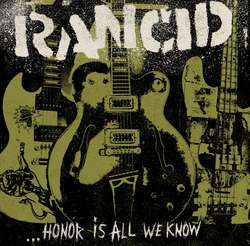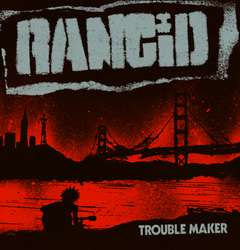I could write a thousand words on Rancid here if I wanted. I spent the better part of the 90's defending them amongst the punx, though my enthusiasm for the band has waned markedly as the current decade has passed.
It's been a few years since their last release: Tim Armstrong's divorce is history, The Transplants experiment is over, and the band has suffered their first member change. The leak of "Last One to Die" only solidified my impression that the band is running on fumes these days and the generic street punk title, Let the Dominoes Fall didn't get me excited. Sure, street punk has always been a big part of Rancid's sound, but as songwriters they've gone so far beyond the basics that it's hard to go back.
From Let's Go until the second self-titled record the band showed steady progress as songwriters and musicians. Sure, they weren't changing the world - or even the world of punk rock - but they were masterfully showing different influences while maintaining a steady "Rancid sound." For the most part, Let the Dominoes Fall does exactly what 2003's Indestructible did: it shows a stagnant band. The most adventurous songs on here are the pre-release press darlings: "Civilian Ways," which sounds much like the political ballad "Arrested in Shanghai" with a bit of twang and "L.A. River," with a chorus that seems to pay homage to Grease while coming at you with a freight train breakdown so conflicting to Freeman's "shimmy shimmy sham" that's downright confusing. I imagine this is what it will sound like if Armstrong's next project involves writing musical theater.
So what's left for a general impression? The band is as active as they've been this millennium, and the side projects are at a rest. As a result, the record feels more focused than Indestructible, yet it doesn't pack the punch of their earlier releases. Too many songs have a first-draft feel that makes it feel like the band is just going through the motions. The chorus of "This Place" feels lazy with chants like "This place! Has lost its people! This place! Has lost its charm!" I'm not going to dub Armstrong the poet laureate, but he's always had a strong narrative feel to his lyrics that meshed well with his melodic slur. After "East Bay Night's "[From] the old house on top of the hill / You can see the San Francisco Bay / Alcatraz over the landfill" reference, there's not a lot here besides anthemic, self-referential blanket statements about the state of the world. Too much of the content merely references the past instead of moving forward. And singing about yourself? I'd had enough of that in the 90 second "Indestructible" last time around. Are they doin' it for the kids, as half the songs claim, or for the strippers and one night stands otherwise mentioned?
And, in case you were wondering, Skinhead Rob is nowhere in sight, though he may as well cameo on "I Ain't Worried," a throwaway track where each vocalist takes a swing at the mic and misses badly.
There is good to be found. "East Bay Night" wastes no time reminding my why I've always liked this band, with descriptive working class lyrics, Armstrong's melodic slurs, Freeman's bass, and a sense of poppy catchiness. "New Orleans," "Dominoes Fall," and "Lulu" are all great, memorable Rancid tracks and "Last One to Die," despite its narcissistic lyrics, utilizes Rancid's melodic hooks as we've grown accustomed to over the years; "The Bravest Kids" has the rumbling bass and group-sung vocals that have carried Rancid's records over the years; and Rancid has always excelled on their ska songs. "Up to No Good" sounds like if "Old Friend" did it with "Fall Back Down" and its peppiness effectively mixes up the album's tempo, much like "Time Bomb" did on that one record in 1995. Armstrong takes charge of the lead vocals, with Matt Freeman and Lars Frederiksen splitting time about equally, though Freeman has fewer notable basslines than you'd expect. Much like on Indestructible, the band is taking a cleaner, poppier approach.
The packaging of the box set is impressive and generous. Two discs plus a DVD makes it hard to complain. I have no need for collector guitar picks or posters, but the concept is nice and the lyric sheets are a necessity with Armstrong's singing. I would have preferred that each disc had its own digipak instead of one fat, fold-out, but what can you do?
Overall, the record definitely exceeded my expectations (and the bonus acoustic CD is surprisingly listenable). Rancid continues to shift their sound in a poppier direction without betraying their roots. For the unapologetic fan, Let the Dominoes Fall is a natural progression in the band's career, and is far less disjointed than Indestructible. It feels complete, and it feels like the band is playing as a unit. There is a good share of classic Rancid on here, but it just doesn't feel like they have anything new to say.






